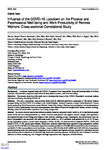Influence of the COVID-19 Lockdown on the Physical and Psychosocial Well-being and Work Productivity of Remote Workers: Cross-sectional Correlational Study
| dc.contributor.author | Tronco Hernández, YA | |
| dc.contributor.author | Parente, F | |
| dc.contributor.author | Faghy, MA | |
| dc.contributor.author | Roscoe, CMP | |
| dc.contributor.author | Maratos, FA | |
| dc.date.accessioned | 2023-02-28T14:10:59Z | |
| dc.date.issued | 2021-12-01 | |
| dc.identifier.issn | 2563-6316 | |
| dc.identifier.issn | 2563-6316 | |
| dc.identifier.other | e30708 | |
| dc.identifier.uri | http://hdl.handle.net/10026.1/20511 | |
| dc.description.abstract |
<jats:sec> <jats:title>Background</jats:title> <jats:p>Lockdowns imposed during the COVID-19 pandemic have impacted the living and working habits of millions of people, with potentially important implications for their physical, mental, and social well-being.</jats:p> </jats:sec> <jats:sec> <jats:title>Objective</jats:title> <jats:p>The primary objective of this study was to investigate the impact of the COVID-19 pandemic on remote workers who were not directly affected by COVID-19.</jats:p> </jats:sec> <jats:sec> <jats:title>Methods</jats:title> <jats:p>This was a correlational cross-sectional study (with an additional qualitative component) of 184 remote workers surveyed during the first COVID-19 lockdown in the United Kingdom. Standard measures of mental health (Kessler-6 Distress Scale), productivity (Brief Instrument to Assess Workers’ Productivity During a Working Day), and physical activity (International Physical Activity Questionnaire) were used, and respondents were further surveyed on changes to their dietary, exercise, smoking, drinking, and socialization habits to produce a well-being change index.</jats:p> </jats:sec> <jats:sec> <jats:title>Results</jats:title> <jats:p>The results revealed associations between sedentary behavior and poorer mental health (τb=0.14) and between poorer mental health and low work productivity (τb=–0.39). However, both positive and negative lifestyle changes were reported; a self-reported increase in well-being (with respect to diet, exercise, smoking, alcohol consumption, and socialization) since the start of the pandemic was associated with both better mental health (τb=–0.14) and better work productivity (τb=0.14). Of note, among respondents without a mental health diagnosis (137/184, 74.4%), we observed rates of moderate (76/137, 55.5%) and severe (17/137, 12.4%) psychological distress, which were markedly higher than those reported in large prepandemic studies; moreover, 70.1% (129/184) of our respondents reported more sedentary behavior, 41% (69/168) increased their alcohol consumption, and 38.6% (71/184) increased their overall food intake. However, 46% (75/163), 44.8% (39/87) and 51.8% (57/110) of respondents reported spending more time walking and engaging in more moderate and vigorous exercise, respectively. Qualitative analysis revealed many positive adaptations to lockdowns (eg, decreased commuting expenses, flexibility) but also a number of structural obstacles to remote working (eg, lack of support and high expectations from employers, childcare duties).</jats:p> </jats:sec> <jats:sec> <jats:title>Conclusions</jats:title> <jats:p>These findings may be of practical importance for policy makers and employers in a world in which work involves long-term remote or hybrid employment arrangements; strategies to promote more sustainable remote working are discussed.</jats:p> </jats:sec> | |
| dc.format.extent | e30708-e30708 | |
| dc.format.medium | Electronic-eCollection | |
| dc.language | en | |
| dc.language.iso | eng | |
| dc.publisher | JMIR Publications | |
| dc.subject | COVID-19 | |
| dc.subject | employment | |
| dc.subject | health policy | |
| dc.subject | mental health | |
| dc.subject | pandemic | |
| dc.subject | policymakers | |
| dc.subject | remote workers | |
| dc.subject | wellbeing | |
| dc.title | Influence of the COVID-19 Lockdown on the Physical and Psychosocial Well-being and Work Productivity of Remote Workers: Cross-sectional Correlational Study | |
| dc.type | journal-article | |
| dc.type | Journal Article | |
| plymouth.author-url | https://www.ncbi.nlm.nih.gov/pubmed/34898665 | |
| plymouth.issue | 4 | |
| plymouth.volume | 2 | |
| plymouth.publication-status | Published online | |
| plymouth.journal | JMIRx Med | |
| dc.identifier.doi | 10.2196/30708 | |
| plymouth.organisational-group | /Plymouth | |
| plymouth.organisational-group | /Plymouth/Faculty of Health | |
| plymouth.organisational-group | /Plymouth/Faculty of Health/School of Health Professions | |
| plymouth.organisational-group | /Plymouth/Users by role | |
| plymouth.organisational-group | /Plymouth/Users by role/Academics | |
| dc.publisher.place | Canada | |
| dcterms.dateAccepted | 2021-07-25 | |
| dc.rights.embargodate | 2023-3-1 | |
| dc.identifier.eissn | 2563-6316 | |
| dc.rights.embargoperiod | Not known | |
| rioxxterms.versionofrecord | 10.2196/30708 | |
| rioxxterms.licenseref.uri | http://www.rioxx.net/licenses/all-rights-reserved | |
| rioxxterms.licenseref.startdate | 2021 | |
| rioxxterms.type | Journal Article/Review |


